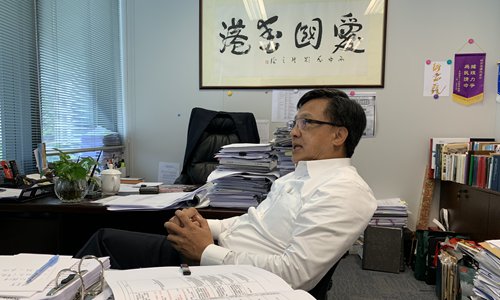HOME >> CHINA
Evidence shows HK riot ‘color revolution’
By Fan Lingzhi and Chen Qingqing in Hong Kong Source:Global Times Published: 2019/8/23 16:33:40
Hong Kong press needs reform as 90% hold wrong positions: legislator
As protests continue and the violence escalates in Hong Kong, all evidence points to a color revolution jointly plotted by anti-government and external forces, and local press needs to reform as it has played the role of accomplice amid social unrest, one of the most outspoken pro-establishment legislators in Hong Kong Special Administrative Region told the Global Times.
Junius Ho Kwan-yiu, a Hong Kong legislator and former president of the Hong Kong Law Society, presented three documents during an exclusive interview with the Global Times on Friday at the Legislative Council Complex, showing how well organized the anti-government forces are. The documents revealed the protesters' cooperation with anti-government parties, the US consulate in Hong Kong, secessionists, and representatives from legal, education and business systems.

Junius Ho Kwan-yiu, a lawyer and pro-establishment legislator in Hong Kong Photo: Chen Qingqing/GT
"From the beginning of June to August 14, there have been 42 protests. If someone told you they were all spontaneous events, would you believe it? More than 40 large-scale demonstrations within about 60 days, without a general commander it would not have happened," he said."In the name of anti-extradition bill, the secessionist movement has become more apparent and intense," Ho said, noting that as a prominent legislator saying "No" to such a movement, anti-government forces would use any means necessary to eliminate his voice and attack him.
Ho has become a main target for radical protesters in recent months. Some black-clad protesters previously vandalized and desecrated the tombstones of his parents' graves in July, and have constantly harassed him and his family. "There are eight categories of forces pushing forward the Hong Kong riots, including the US consulate, the Civil Human Rights Front, and representatives from the education and legal systems," he noted.
"External forces engaging in the color revolution do not need to fight you from the outside, they will use your internal conflicts to destroy you," Ho said.
Several Chinese ambassadors have criticized foreign interference in Hong Kong affairs, following Chinese Ambassador to the US Cui Tiankai publicly pointing out that some ill-intentioned forces both inside and outside Hong Kong are trying to sabotage the rule of law there, and are trying to threaten the bottom line of the "one country, two systems" principle.
Ho also mentioned that some Hong Kong reporters have played an important role in helping escalate the violence, as they hold biased positions and mislead public opinion.
"Ninety percent of Hong Kong media have the wrong position, which requires a deep reflection. Who will define the professionalism of reporters?" Ho said, suggesting that the Hong Kong Special Administrative Region government should consider introducing a registration-based system to evaluate all local journalists and their qualifications.
"During protests, some Hong Kong media exposed police deployment. When police enforced the law, they aimed to shoot footage of police. On the contrary, when rioters attacked ordinary people, they all remained silent," Ho said, noting that there are very few local journalists who are righteous and courageous.
When a journalist surnamed Chen from the Chinese mainland recorded the press conference featuring police addressing the media on Wednesday, a reporter from the Hong Kong-based Apple Daily rudely interrupted her and aggressively criticized her for shooting footage of the reporter's face. The incident followed the harassment of some journalists from the mainland, as they were discriminated against and treated violently in Hong Kong when they covered the anti-government protests.
"They think mainland reporters come to see their ugly performance, that's why they are against you if you take footage of them," Ho said.
"We need valuable information amid social unrest, we all should reject fake news and misleading information, and our press indeed needs reform," he added.
RELATED ARTICLES:
Posted in: SOCIETY